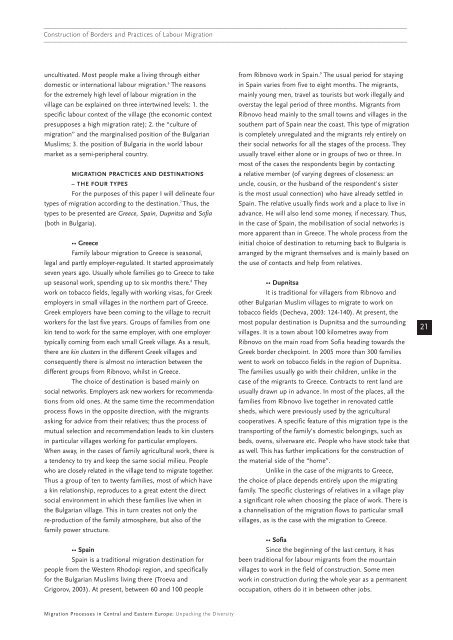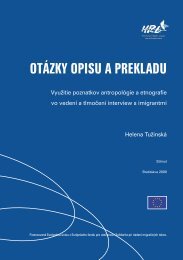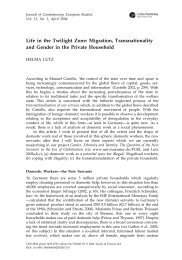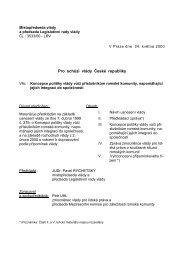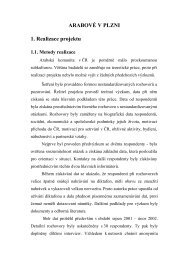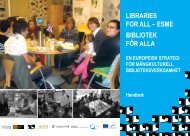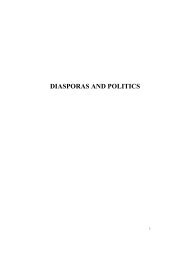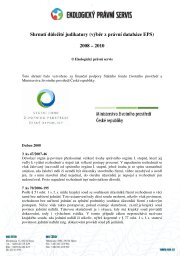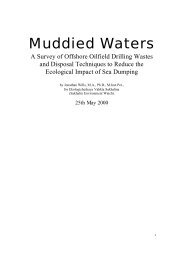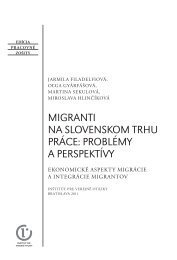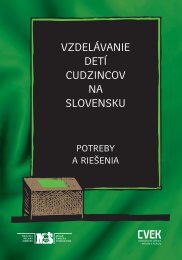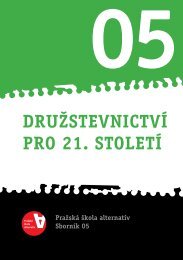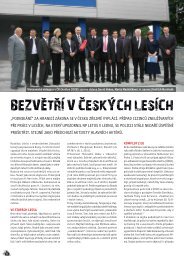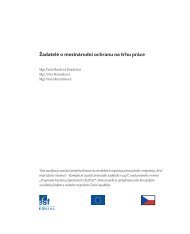Migration Processes in Central and Eastern Europe - Multiple Choices
Migration Processes in Central and Eastern Europe - Multiple Choices
Migration Processes in Central and Eastern Europe - Multiple Choices
You also want an ePaper? Increase the reach of your titles
YUMPU automatically turns print PDFs into web optimized ePapers that Google loves.
———————————————————————————————————————————————————————————————<br />
Construction of Borders <strong>and</strong> Practices of Labour <strong>Migration</strong><br />
———————————————————————————————————————————————————————————————<br />
uncultivated. Most people make a liv<strong>in</strong>g through either<br />
domestic or <strong>in</strong>ternational labour migration. 6 The reasons<br />
for the extremely high level of labour migration <strong>in</strong> the<br />
village can be expla<strong>in</strong>ed on three <strong>in</strong>tertw<strong>in</strong>ed levels: 1. the<br />
specific labour context of the village (the economic context<br />
presupposes a high migration rate); 2. the “culture of<br />
migration” <strong>and</strong> the marg<strong>in</strong>alised position of the Bulgarian<br />
Muslims; 3. the position of Bulgaria <strong>in</strong> the world labour<br />
market as a semi-peripheral country.<br />
MIGRATION PRACTICES AND DESTINATIONS<br />
– THE FOUR TYPES<br />
For the purposes of this paper I will del<strong>in</strong>eate four<br />
types of migration accord<strong>in</strong>g to the dest<strong>in</strong>ation. 7 Thus, the<br />
types to be presented are Greece, Spa<strong>in</strong>, Dupnitsa <strong>and</strong> Sofia<br />
(both <strong>in</strong> Bulgaria).<br />
•• Greece<br />
Family labour migration to Greece is seasonal,<br />
legal <strong>and</strong> partly employer-regulated. It started approximately<br />
seven years ago. Usually whole families go to Greece to take<br />
up seasonal work, spend<strong>in</strong>g up to six months there. 8 They<br />
work on tobacco fields, legally with work<strong>in</strong>g visas, for Greek<br />
employers <strong>in</strong> small villages <strong>in</strong> the northern part of Greece.<br />
Greek employers have been com<strong>in</strong>g to the village to recruit<br />
workers for the last five years. Groups of families from one<br />
k<strong>in</strong> tend to work for the same employer, with one employer<br />
typically com<strong>in</strong>g from each small Greek village. As a result,<br />
there are k<strong>in</strong> clusters <strong>in</strong> the different Greek villages <strong>and</strong><br />
consequently there is almost no <strong>in</strong>teraction between the<br />
different groups from Ribnovo, whilst <strong>in</strong> Greece.<br />
The choice of dest<strong>in</strong>ation is based ma<strong>in</strong>ly on<br />
social networks. Employers ask new workers for recommendations<br />
from old ones. At the same time the recommendation<br />
process flows <strong>in</strong> the opposite direction, with the migrants<br />
ask<strong>in</strong>g for advice from their relatives; thus the process of<br />
mutual selection <strong>and</strong> recommendation leads to k<strong>in</strong> clusters<br />
<strong>in</strong> particular villages work<strong>in</strong>g for particular employers.<br />
When away, <strong>in</strong> the cases of family agricultural work, there is<br />
a tendency to try <strong>and</strong> keep the same social milieu. People<br />
who are closely related <strong>in</strong> the village tend to migrate together.<br />
Thus a group of ten to twenty families, most of which have<br />
a k<strong>in</strong> relationship, reproduces to a great extent the direct<br />
social environment <strong>in</strong> which these families live when <strong>in</strong><br />
the Bulgarian village. This <strong>in</strong> turn creates not only the<br />
re-production of the family atmosphere, but also of the<br />
family power structure.<br />
•• Spa<strong>in</strong><br />
Spa<strong>in</strong> is a traditional migration dest<strong>in</strong>ation for<br />
people from the Western Rhodopi region, <strong>and</strong> specifically<br />
for the Bulgarian Muslims liv<strong>in</strong>g there (Troeva <strong>and</strong><br />
Grigorov, 2003). At present, between 60 <strong>and</strong> 100 people<br />
from Ribnovo work <strong>in</strong> Spa<strong>in</strong>. 9 The usual period for stay<strong>in</strong>g<br />
<strong>in</strong> Spa<strong>in</strong> varies from five to eight months. The migrants,<br />
ma<strong>in</strong>ly young men, travel as tourists but work illegally <strong>and</strong><br />
overstay the legal period of three months. Migrants from<br />
Ribnovo head ma<strong>in</strong>ly to the small towns <strong>and</strong> villages <strong>in</strong> the<br />
southern part of Spa<strong>in</strong> near the coast. This type of migration<br />
is completely unregulated <strong>and</strong> the migrants rely entirely on<br />
their social networks for all the stages of the process. They<br />
usually travel either alone or <strong>in</strong> groups of two or three. In<br />
most of the cases the respondents beg<strong>in</strong> by contact<strong>in</strong>g<br />
a relative member (of vary<strong>in</strong>g degrees of closeness: an<br />
uncle, cous<strong>in</strong>, or the husb<strong>and</strong> of the respondent's sister<br />
is the most usual connection) who have already settled <strong>in</strong><br />
Spa<strong>in</strong>. The relative usually f<strong>in</strong>ds work <strong>and</strong> a place to live <strong>in</strong><br />
advance. He will also lend some money, if necessary. Thus,<br />
<strong>in</strong> the case of Spa<strong>in</strong>, the mobilisation of social networks is<br />
more apparent than <strong>in</strong> Greece. The whole process from the<br />
<strong>in</strong>itial choice of dest<strong>in</strong>ation to return<strong>in</strong>g back to Bulgaria is<br />
arranged by the migrant themselves <strong>and</strong> is ma<strong>in</strong>ly based on<br />
the use of contacts <strong>and</strong> help from relatives.<br />
•• Dupnitsa<br />
It is traditional for villagers from Ribnovo <strong>and</strong><br />
other Bulgarian Muslim villages to migrate to work on<br />
tobacco fields (Decheva, 2003: 124-140). At present, the<br />
most popular dest<strong>in</strong>ation is Dupnitsa <strong>and</strong> the surround<strong>in</strong>g<br />
villages. It is a town about 100 kilometres away from<br />
Ribnovo on the ma<strong>in</strong> road from Sofia head<strong>in</strong>g towards the<br />
Greek border checkpo<strong>in</strong>t. In 2005 more than 300 families<br />
went to work on tobacco fields <strong>in</strong> the region of Dupnitsa.<br />
The families usually go with their children, unlike <strong>in</strong> the<br />
case of the migrants to Greece. Contracts to rent l<strong>and</strong> are<br />
usually drawn up <strong>in</strong> advance. In most of the places, all the<br />
families from Ribnovo live together <strong>in</strong> renovated cattle<br />
sheds, which were previously used by the agricultural<br />
cooperatives. A specific feature of this migration type is the<br />
transport<strong>in</strong>g of the family's domestic belong<strong>in</strong>gs, such as<br />
beds, ovens, silverware etc. People who have stock take that<br />
as well. This has further implications for the construction of<br />
the material side of the “home”.<br />
Unlike <strong>in</strong> the case of the migrants to Greece,<br />
the choice of place depends entirely upon the migrat<strong>in</strong>g<br />
family. The specific cluster<strong>in</strong>gs of relatives <strong>in</strong> a village play<br />
a significant role when choos<strong>in</strong>g the place of work. There is<br />
a channelisation of the migration flows to particular small<br />
villages, as is the case with the migration to Greece.<br />
•• Sofia<br />
S<strong>in</strong>ce the beg<strong>in</strong>n<strong>in</strong>g of the last century, it has<br />
been traditional for labour migrants from the mounta<strong>in</strong><br />
villages to work <strong>in</strong> the field of construction. Some men<br />
work <strong>in</strong> construction dur<strong>in</strong>g the whole year as a permanent<br />
occupation, others do it <strong>in</strong> between other jobs.<br />
21<br />
<strong>Migration</strong> <strong>Processes</strong> <strong>in</strong> <strong>Central</strong> <strong>and</strong> <strong>Eastern</strong> <strong>Europe</strong>: Unpack<strong>in</strong>g the Diversity


